With cyber-crimes growing at an alarming rate, online security is the need of the hour!
Do you know an SSL Certificate can protect your website from online threats, enhance your SEO ranking, and make you appear more authentic? Well, SSL is a must for every website owner today!
In this article, I’m going to help you understand what exactly an SSL Certificate is, what are its differents types, and why you should get one today!
There are different types of SSL Certificates that serve different needs, which is why I’ll also help you get the right one for your website.
So without any more delay, let’s jump in!
- HTTP VS HTTPS
- What is an SSL Certificate?
- Do I Need an SSL Certificate?
- Why is an SSL Certificate Important?
- How Does SSL Work?
- How to Check if SSL is installed on a Website?
- Types of SSL Certificates
- Based On Validation Level –
- By Number of Secured Domains
- How and Where to Purchase an SSL Certificate?
- Factors to Consider While Buying an SSL Certificate
- Conclusion
Let’s understand what are SSL Certificates and the types of SSL Certificates. There are many SSL Certificate types and I’ll help you to get the right SSL Certificate for your website today.
HTTP VS HTTPS
HTTP and HTTPS are protocols used for transferring files and viewing websites on the Internet. They perform the same task, but are different. Let’s find out how!
HTTP: Hypertext Transfer Protocol
If a website uses HTTP, all the information exchanged between you and the web-server is in plain text. Thus, it is highly vulnerable to hackers’ attacks.
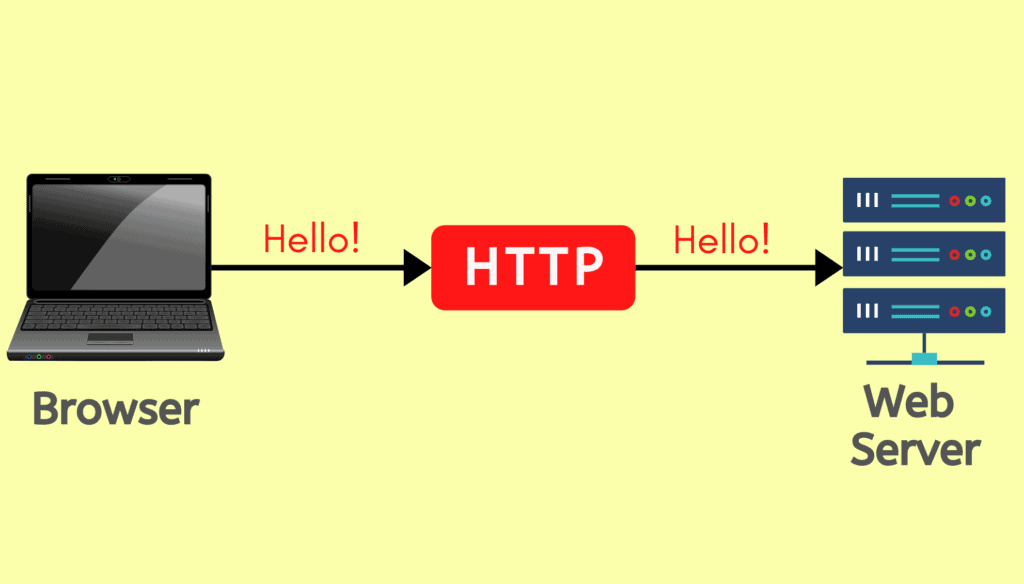
Basic blogging websites are not much affected by this. But entering your bank details on websites using HTTP is like inviting hackers to come and steal your data!
HTTPS: Secure Hypertext Transfer Protocol
HTTPS is the upgraded version of HTTP. As the extra ‘S’ suggests, it enhances a website’s security. But how does it do that?
By creating an encrypted connection between your browser and the web server! All the data sent over the network is protected using encryption algorithms.
These algorithms scramble your data into an unreadable format.
For example, if I entered my password as “Hello” on some website, HTTPS encryption would convert it into something like “5$%a#!&” before sending it over the network. Impressive, huh?
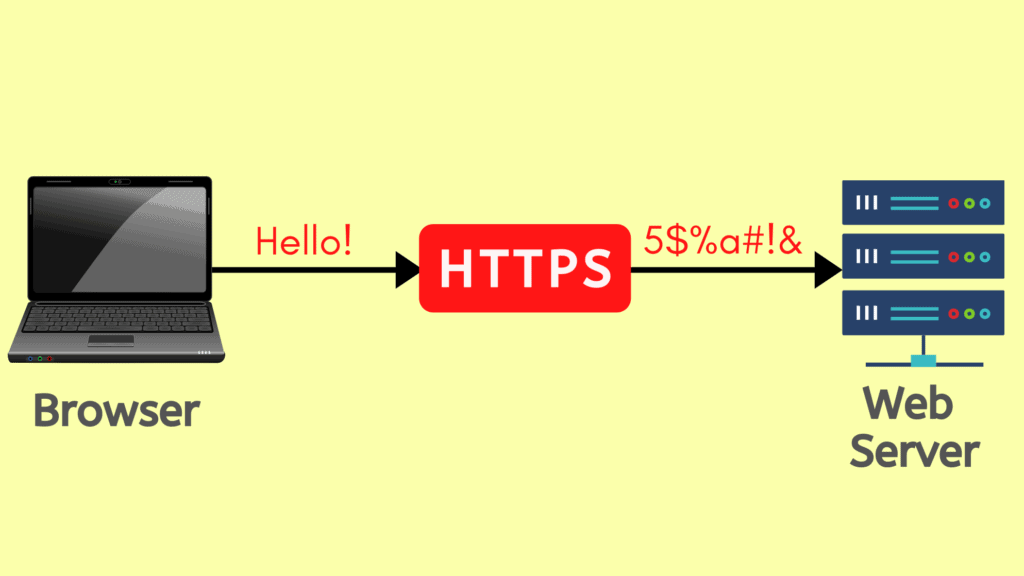
Now, even if hackers steal your information, they cannot decrypt it. This is how HTTPS encryption offers an added layer of security.
What is an SSL Certificate?
SSL (Secure Socket Layer) Certificate is a digital certificate that authenticates the identity of your website. It attaches a cryptographic key along with your details.
This key authenticates that you are the actual owner of a particular domain name.
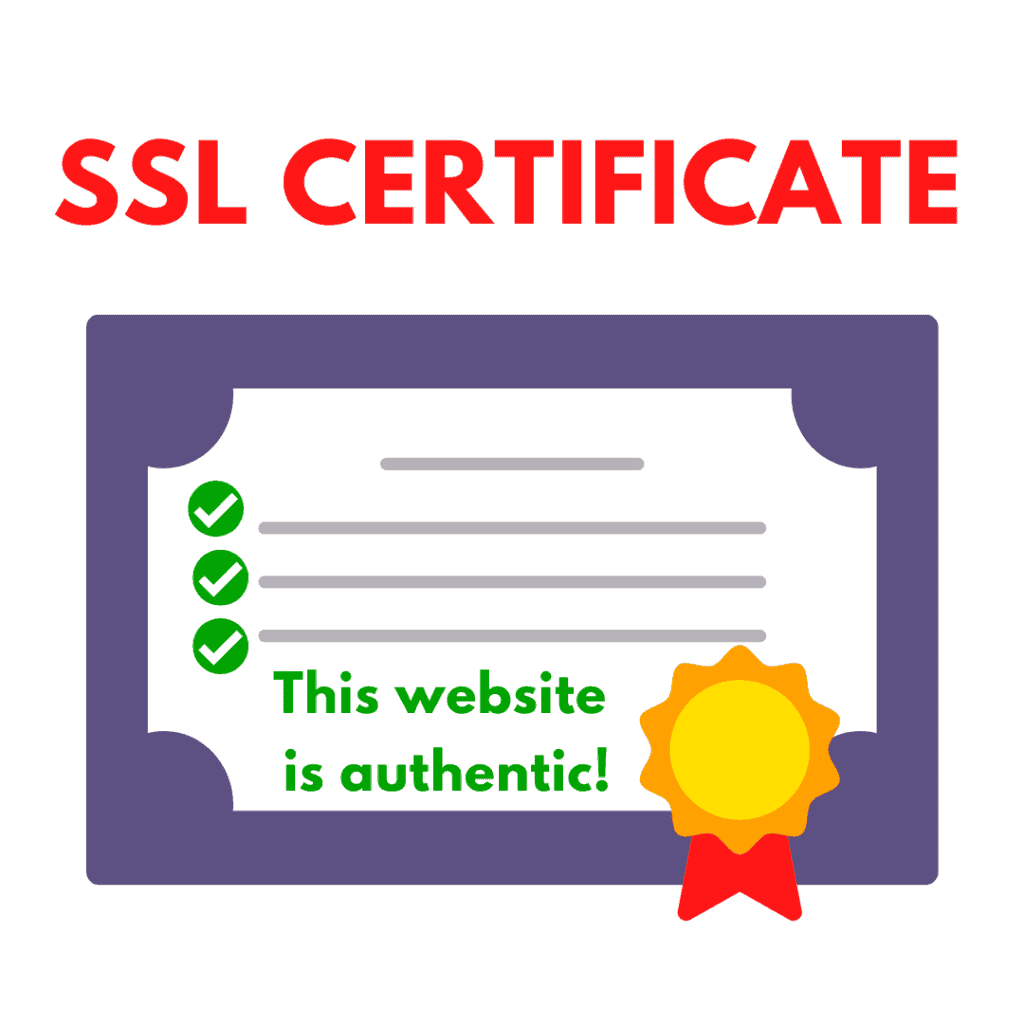
Do I Need an SSL Certificate?
Yes, of course! You need an SSL Certificate if your website requires users to:
- Enter sensitive data like payment details
- Create accounts
- Fill online forms
- Buy a product/service
- Enter passwords, etc.
These processes require a high level of security. An SSL Certificate encrypts the data transferred from the user’s browser to the website’s server.
Now if the user enters his/her payment details, or other sensitive information on your site, it remains protected from the prying eyes of hackers.
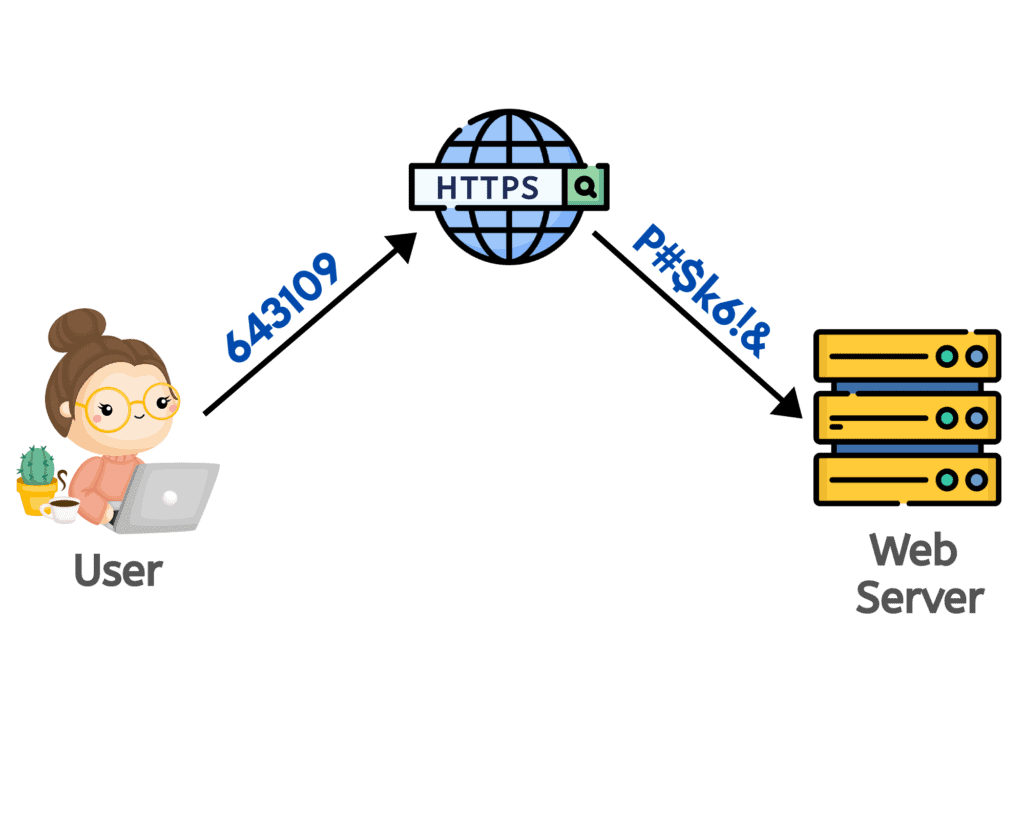
Even if a hacker gets hold of this data, he cannot decode it! This is how an SSL Certificate enhances security.
Why is an SSL Certificate Important?
I hope you now understand what an SSL Certificate is. But why do you need it? Why has there been a buzz about SSL Certificates recently?
There might be several reasons for that. Let me walk you through them.
1) Prevents Hijacking Of User’s Data
As a website owner, you hold the responsibility of all the data your customers/users enter on your website.
For example, if a user is filling an online form on your website, then whatever he types in his browser should only and only go to your web server.
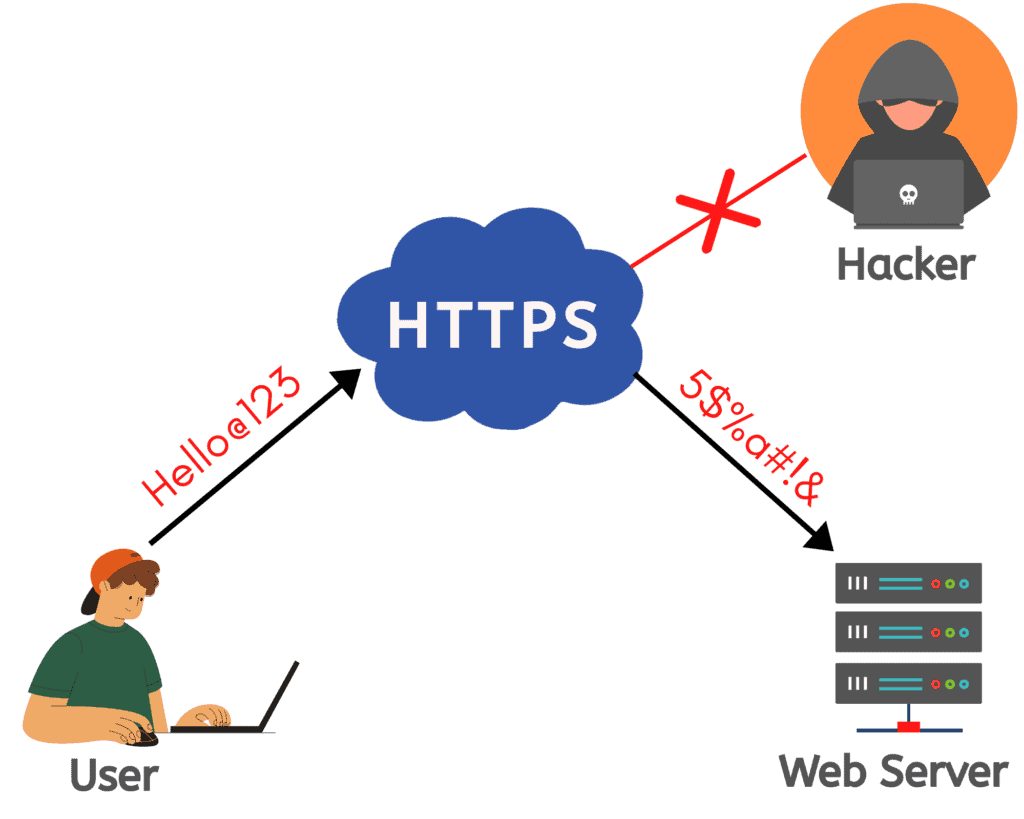
SSL helps by encrypting the data being transferred between the user and the website so that nobody can snoop on it midway.
2) Secures Your Web Pages
You must’ve come across this warning page while visiting some or the other websites.
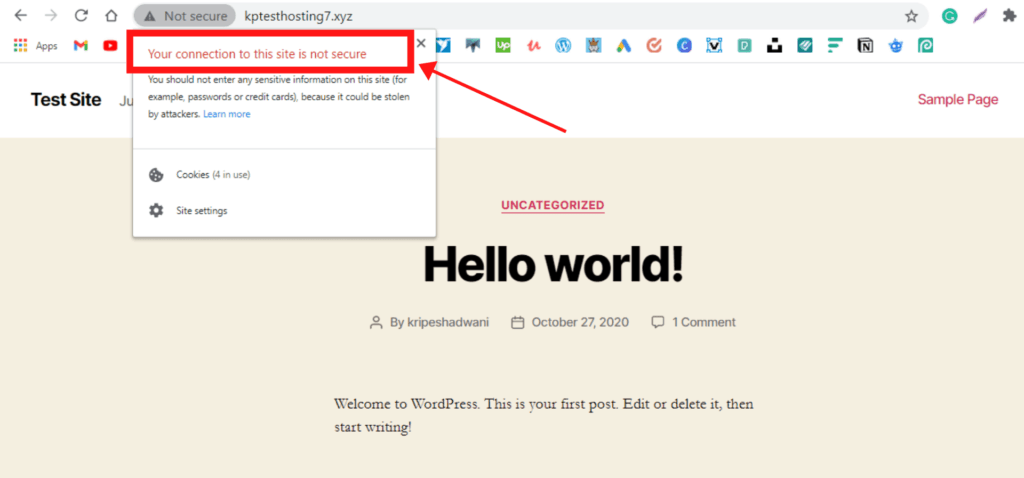
Have you wondered what makes these sites ‘not secure’?
If you have been in touch with the news updates, you know that Google is flagging the websites without an SSL Certificate as ‘not secure’.
Google has stated that websites with an SSL Certificate would receive an extra advantage in its search results ranking.
This also means that Google would not consider you in its search rankings, no matter how amazing or informative your content is if you don’t have an SSL Certificate.
I feel like this is a brilliant move made by Google to boost its users’ security by eliminating the loopholes through which hackers can steal data.
Also, they have used Color Psychology very effectively.
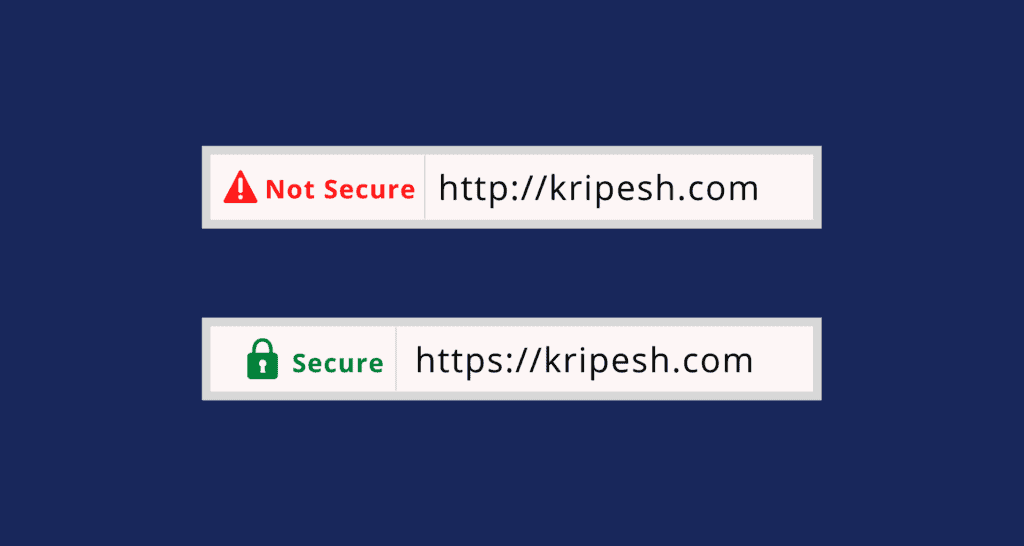
An HTTP website shows a Red warning sign, which is a sign of danger. An HTTPS website shows a Green padlock which also means safety and security.
So, any normal person would, by default, trust the green signals and not the red ones.
3) Affects Other SEO Factors
Talking of 2020, it is now mandatory for every website owner to have an SSL Certificate if they wish to improve their search engine rankings.
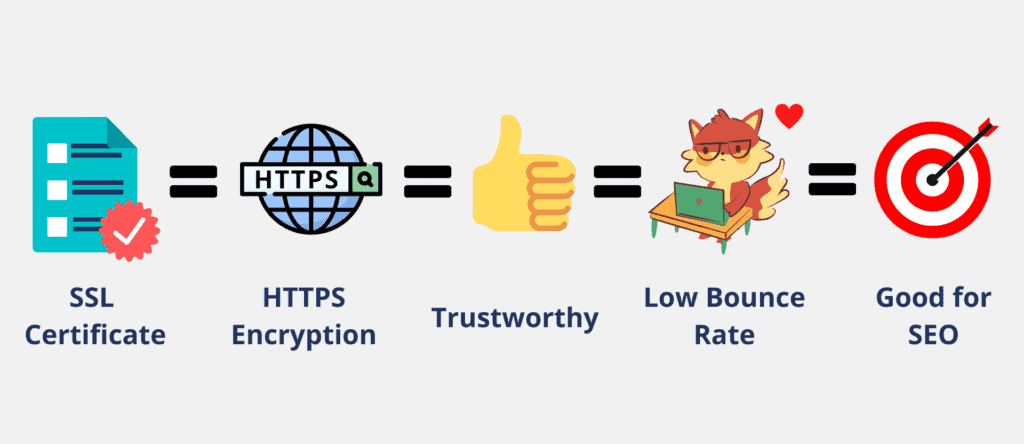
An SSL Certificate guarantees a more secure connection. This ensures a low bounce rate, i.e., visitors would stay longer on your website. Thus, it’s good for SEO.
4) Develops Trust and Confidence
Having an SSL Certificate makes your website look more trustworthy.
This is important if you’re selling products, or people create accounts on your site. SSL authenticates that all their information is secure with you.
An HTTPS encryption builds more trust and confidence among people, so they are more likely to buy from secure sites. Thus, having an SSL Certificate can also give a boost to your conversion rates!
How Does SSL Work?
You must be wondering how an SSL Certificate works. HTTPS Encryption uses SSL (Secure Sockets Layer) to ensure the users’ security. Let’s understand the process with a simple example.
Let’s say you want to visit the website kripesh.com. You will type it in your browser’s address bar and hit enter. Now, let’s see what happens next.
- Your browser sends a request to this website’s (kripesh.com) web server for allowing access to its web pages.
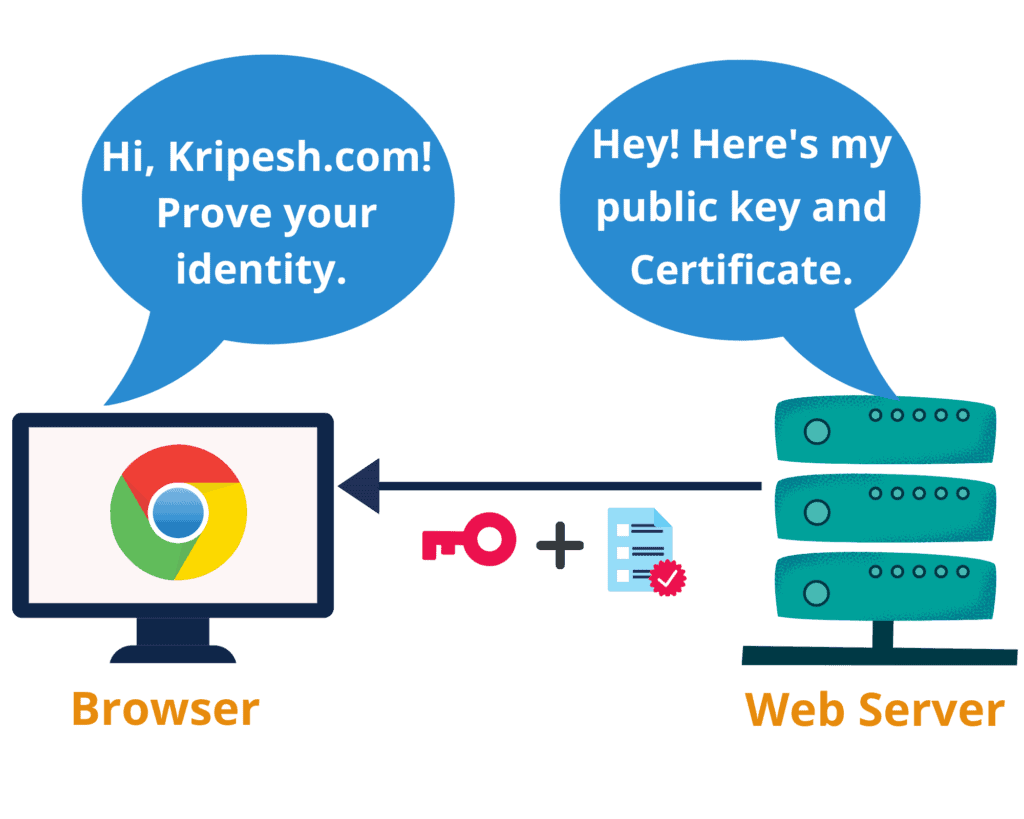
- The web server responds by sending its public key along with its digital certificate signed by a certification authority.
- Your browser will cross-check the certificate issuer’s digital signature to make sure the certificate is valid.
- If it is valid, a green padlock icon appears in the address bar. (If the verification fails, then the red ‘not secure’ warning sign appears.)
- To start a communication, the browser sends a message encrypted with the server’s public key to the web server.
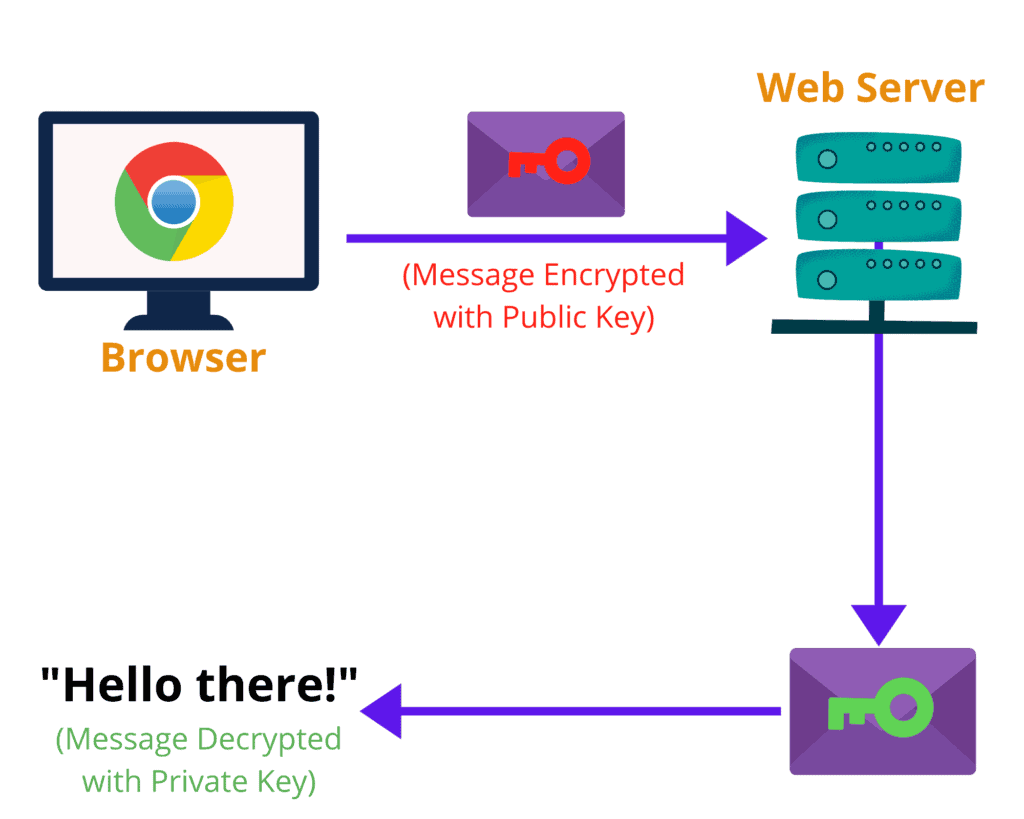
- The server decodes it using its private key. (Only the server can decode messages using a private key.)
- The beauty about this process is that only these two will understand and decode each other’s messages because nobody else has the public or private key to access this data.
- A secure channel is created for communication between the web browser and the web server. This is how SSL works.
How to Check if SSL is installed on a Website?
It’s super easy to check if a website has an SSL Certificate. Next time you visit a website, look for the following pointers. An encrypted website:
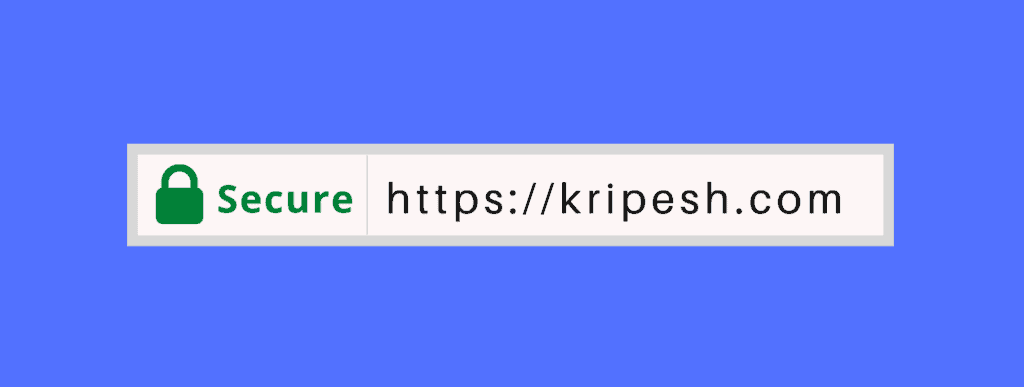
1) Follows HTTPS Protocol.
HTTPS Protocol encrypts your data before sending it over the network. It is written just before the domain name in the address bar.
Insecure websites use the HTTP Protocol.
2) Has a Green Padlock Symbol
You will find a green padlock on the top left corner in the address bar that says ‘Connection is Secure’. If you click on it, you can also view their SSL Certificate details.
An Insecure website shows a red warning sign with ‘Not Secure’ written in red, and a web page dedicated to convey the message ‘Your connection is not private’. It looks something like this.
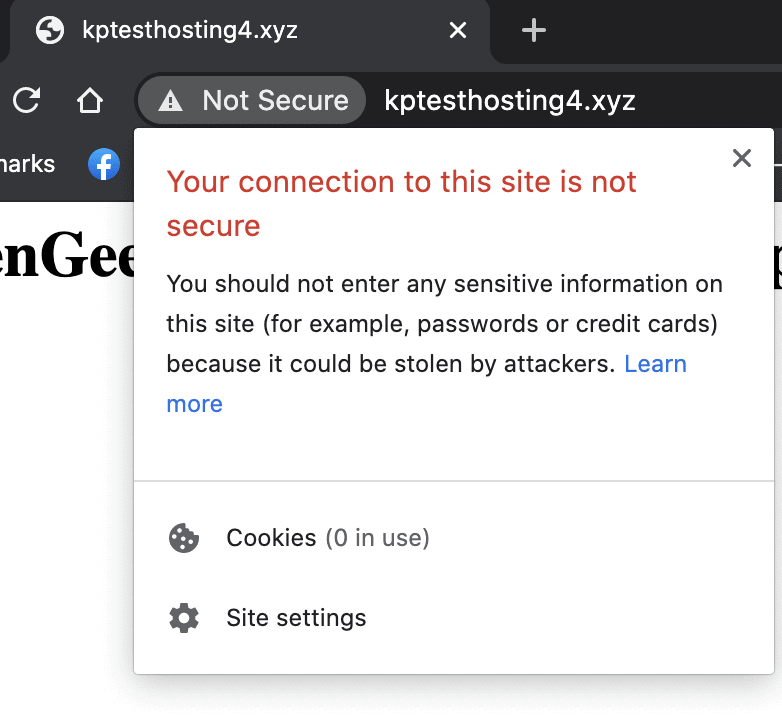
All websites that require the user to make payments, fill online forms, login into accounts, or submit any sensitive information must have an HTTPS encryption.
Types of SSL Certificates
There are different SSL Certificates available today. Which one should you purchase? It depends on the kind of website you own. Most web hosting companies offer free SSL certificates with their plans.
Though all SSL certificates do the same thing (encrypt information), a blogging website, an e-commerce website, a corporate website, and a government website, all require different SSL Certificates.
SSL Certificates are divided into 2 types based on:
- Validation Level
- Number of Secured Domains
Based On Validation Level –
SSL Validation is the first step for getting an SSL Certificate for your domain. It is the way the Certification Authority verifies your identity to confirm you are authentic.
The encryption level for all certificates remains the same, but there are different levels of validation ranging from very lenient to very strict.
This helps the Certification Authority verify if you are the person you are claiming to be, and you own the domain you want the certificate for.
Blogging websites might require a lenient level of validation, while websites of big organizations need to go through a stricter level of validation.
Based on Level of Validation, SSL Certificates are of 3 types.
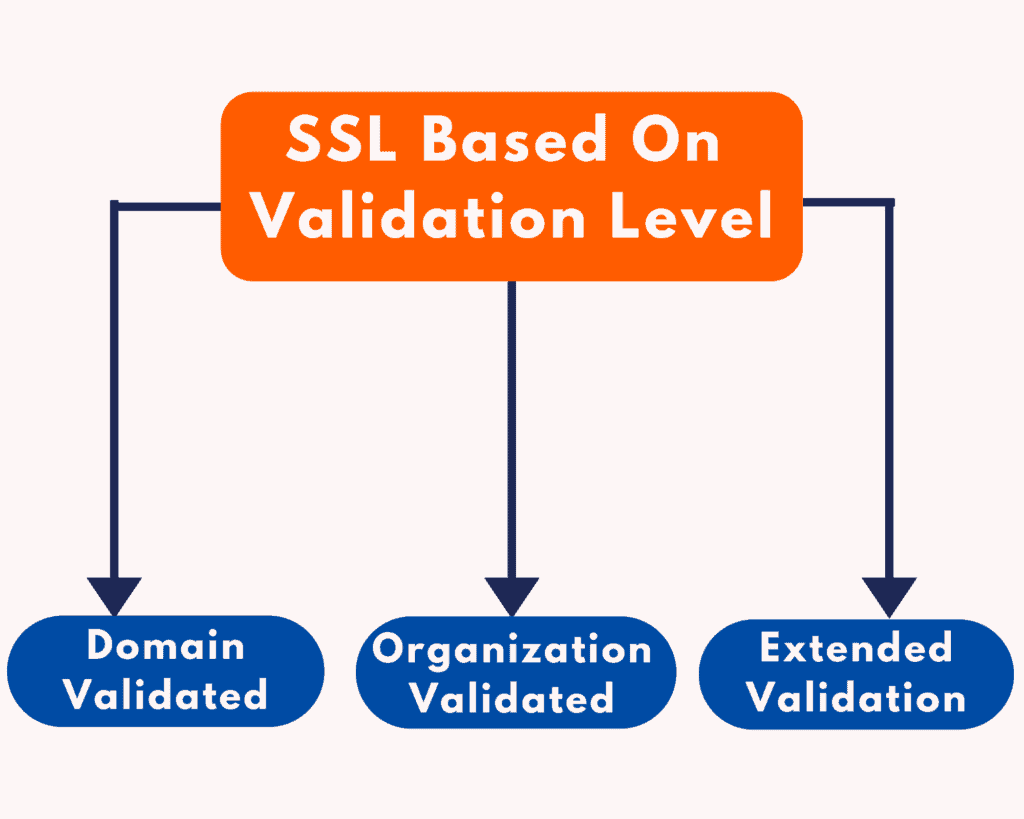
1) Domain Validated:
This validation confirms that the registered domain is valid, and the domain owner is the actual owner. A CA can verify this through an Email verification process.
This is one of the cheapest and easiest validation methods and only takes a few minutes to issue the certificate.
It requires no extra documents for verification and is valid for 1-3 years, depending on your choice of certification authority.
This validation provides a basic encryption and is appropriate for blogging websites, small businesses, etc that don’t sell any products or services.
A major flaw of this validation is security. As the validation process is lenient, even hackers can get themselves validated and con innocent people.
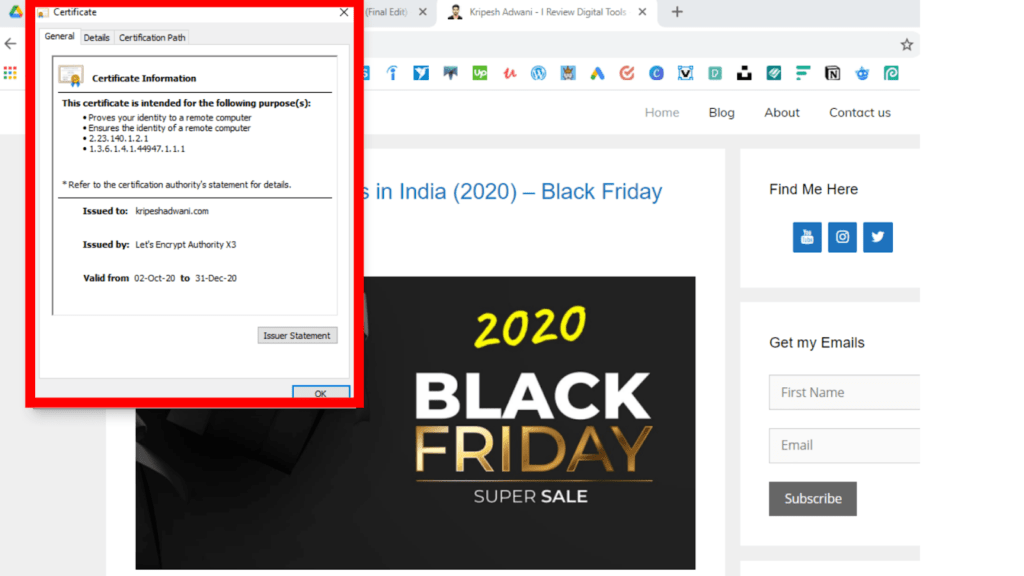
Once validated, it displays the following to your visitors:
- HTTPS Encryption
- Green padlock on the address bar
2) Organization Validated:
This validation builds your customer’s trust. Here, the Certification Authority demands some extra steps for verification.
It verifies the ownership of your organization, and its website. Along with this, it also authenticates your organisation’s identity, business information, location, etc.
This validation is expensive and requires a few hours or days to issue the certificate. It is valid for 1-3 years depending on your certification authority.
The purpose of this validation is to ensure safer online transactions by encrypting the user’s data. Thus, it is best suited for e-commerce and user-registration websites.
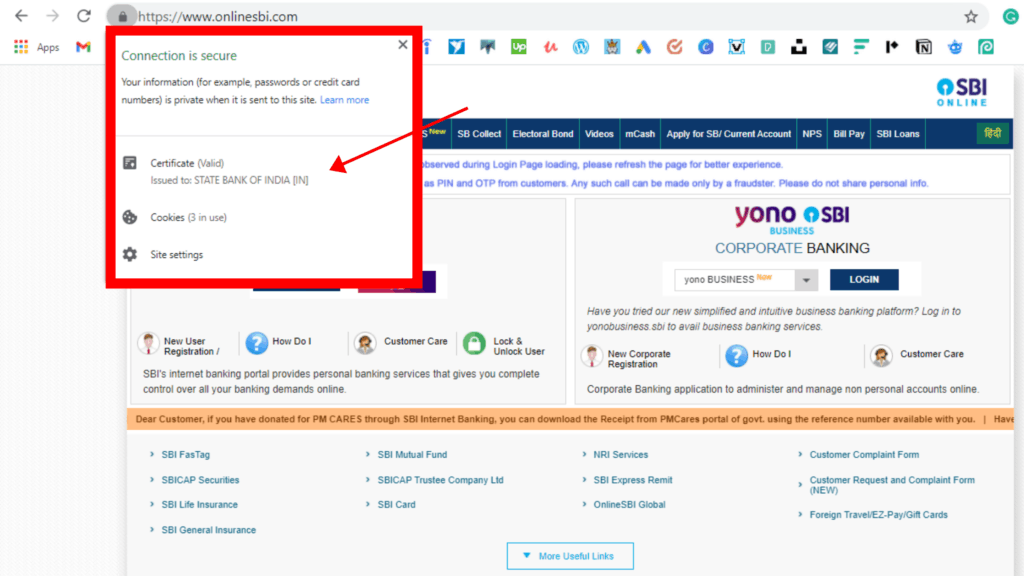
Once validated, it displays the following to your customers:
- HTTPS Encryption
- Green padlock on the address bar
- Your company’s name and country on the address bar
The easiest way to identify phishing scams is through validation certificates. All the major banking and other websites always display their name alongside the ‘Issued To’ column.
So, the next time you visit a website, make sure to check out its SSL Certificate and confirm its identity before making any transactions.
3) Extended Validation:
This validation is the strictest of all and requires more documents and paperwork during verification. The Certification Authority conducts an investigation to confirm the ownership of the organization.
It validates if the company’s registration is legal, and if you own the rights of the business.
This validation is the most expensive and requires days or even weeks to issue the certificate.
The validity of this certificate is 1-2 years according to your chosen certificate issuing authority. Extended Validation Certificates are ideal for websites involving banking, online finances, credit cards, etc.
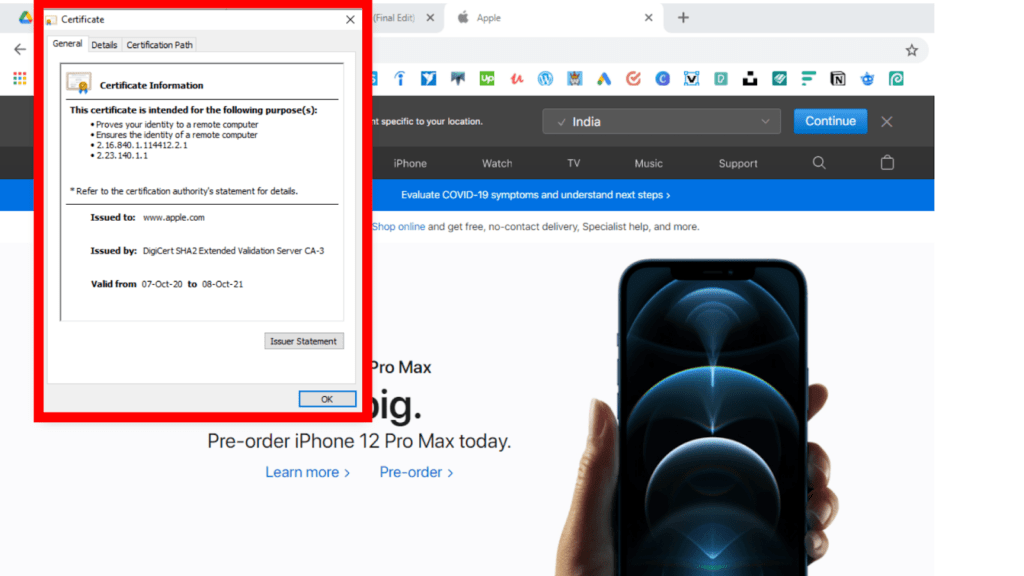
Once validated, it displays the following to your visitors:
- HTTPS Encryption
- Green padlock on the address bar
- Your company’s name and country on the address bar
By Number of Secured Domains
Another way of classifying SSL Certificates is according to the number of domains they secure. Let’s check them out one by one.
1) Single Domain Certificate
This Certificate only applies to a single domain. It does not secure the sub-domains of the certified domain.
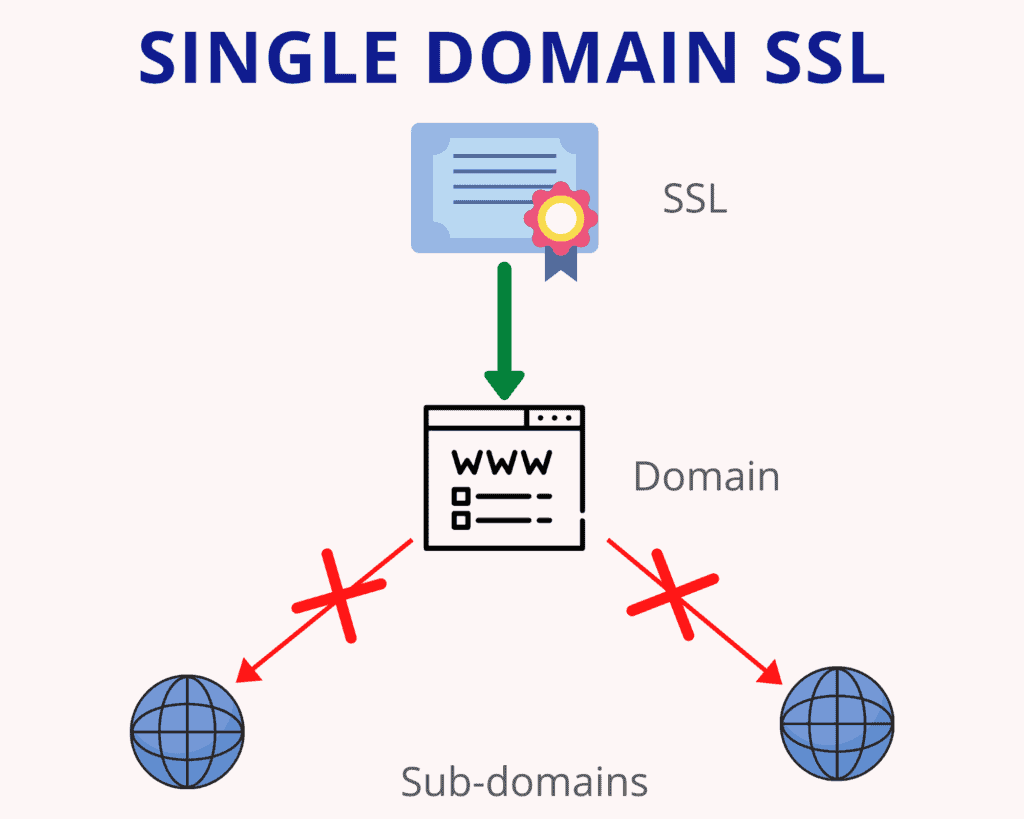
For example, if I purchase a Single-Domain Certificate for my website kripesh.com, then it will not apply to blog.kripesh.com.
This certificate is suitable for blogs, portfolio sites, or small to medium businesses that run limited websites.
The only problem is you need multiple Single-Domain Certificates to protect your sub-domains. It can be a headache! This is where Wildcard Certificates help.
2) Wildcard Certificates
Wildcard Certificates secure all sub-domains falling under a domain. They can protect one primary domain along with its sub-domains.
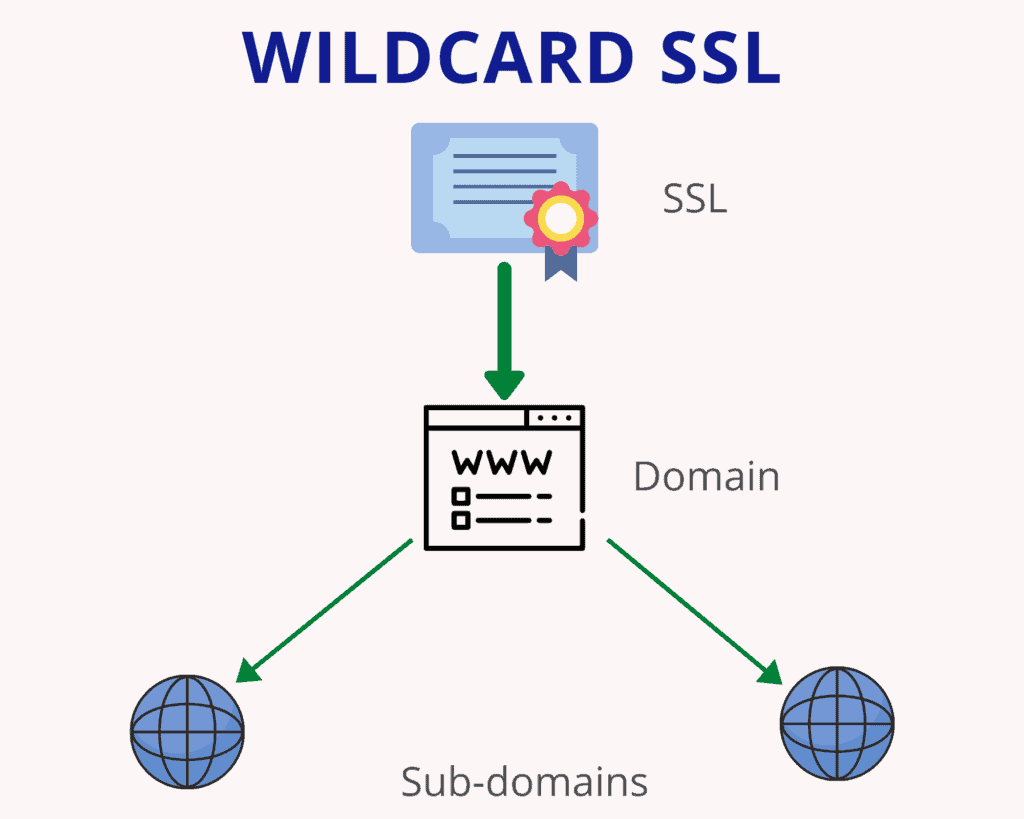
This option is cheaper than buying lots of single domain SSLs.
So, now if I purchase a Wildcard Certificate for kripesh.com, then it will apply to
Blog.kripesh.com
Web.kripesh.com
Store.kripesh.com
Hello.kripesh.com
And all other sub-domains under this domain.
3) Multiple Domain Certificate:
Multiple Domain Certificate (also called SAN or UCC Certificate) is used to protect multiple domains under a single certificate.
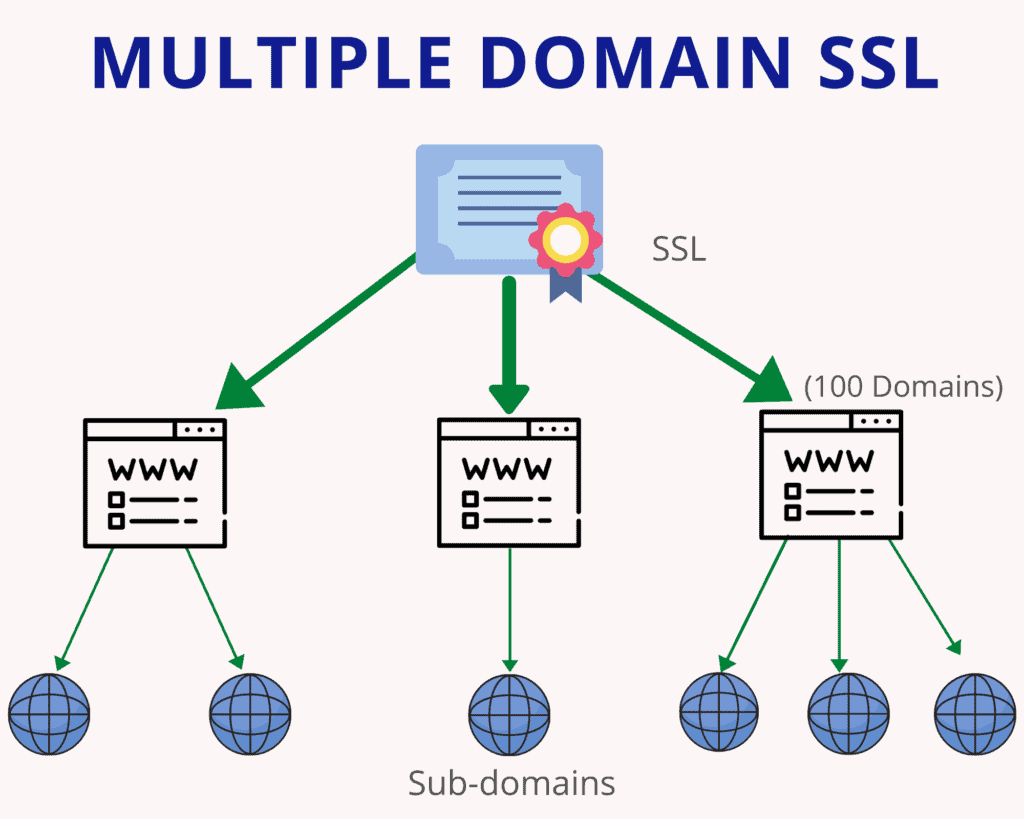
You can secure upto 100-150 different domains and their sub-domains with one certificate, depending on the certification authority.
For example, if I have an e-commerce store. Then I may need Multiple Domain SSL for country level domains.
I can get a Multi-domain Certificate for these together.
4) Multi-Domain Wildcard
As is clear from the name itself, this certificate combines a Wildcard certificate and a Multi-Domain certificate.
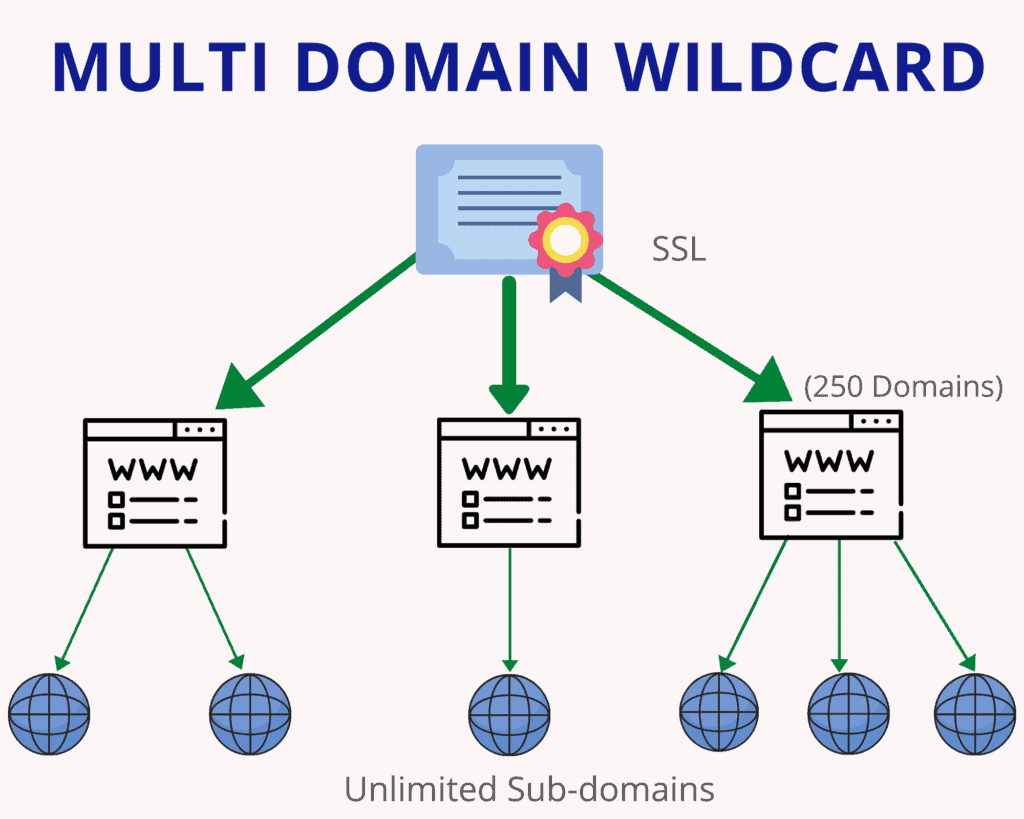
It can secure upto 250 different domains and an unlimited number of sub-domains falling under them.
5) Code Signing Certificates
If you are a software developer or a coder, this certificate might be the best choice for you.
Code Signing Certificates protect the source code of your applications and software through encryption. It makes sure that the code has not tampered with since it was originally signed. This prevents hackers from stealing it.
Also helps users to understand if the software can be trusted
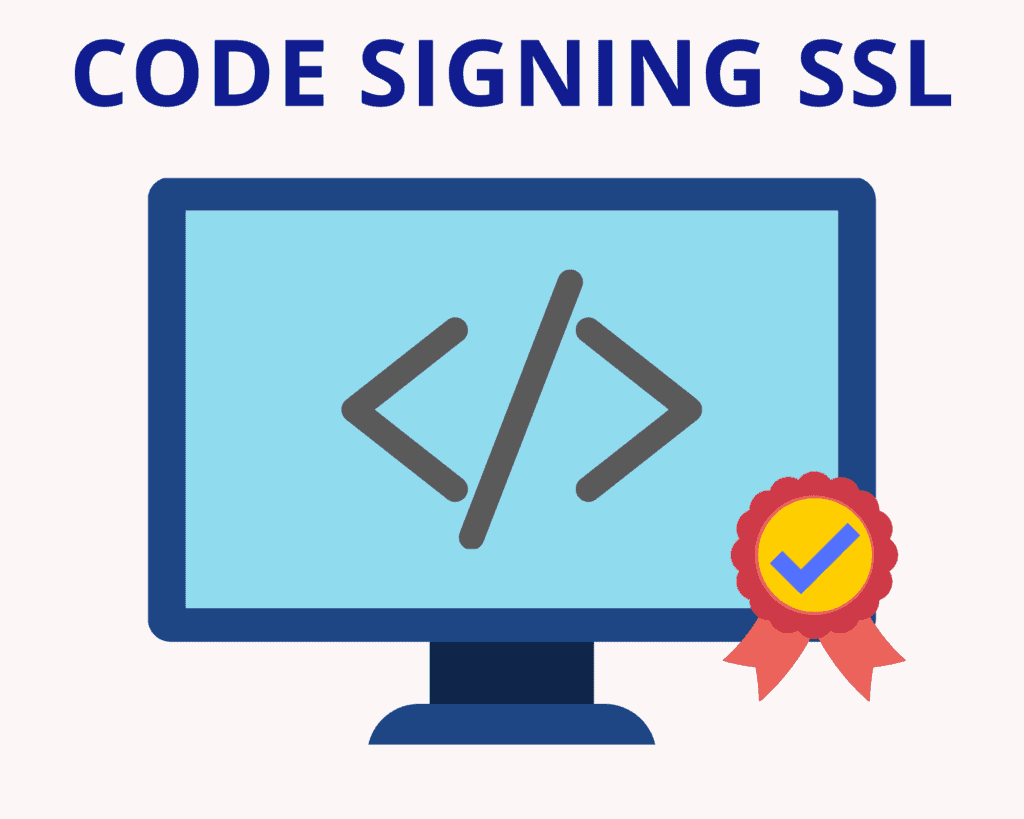
They verify the code developer’s identity so that people who buy from you can ensure your authenticity and reliability.
They also build more trust and confidence among your users, and might as well increase your number of app downloads or purchases.
6) Self-Signed SSL Certificate
You don’t need a Certification Authority in a Self-signed SSL. If you are the domain owner, you can generate the Certificate for your website.
This certificate provides a secure connection through HTTPS encryption. But here’s the catch. Anyone can create this certificate!
How can it be ‘validation’ without the involvement of a third party? A major drawback is that even hackers can issue themselves a self-signed SSL. Then they can rob you of your sensitive data.
I found this certificate ineffective. But you can use it for basic blogging websites.
How to Choose Which Certificate is Best for My Website?
Summing up whatever we have discussed above, you might go with:
- Domain Validated SSL – for blogs, portfolio sites, personal websites, etc.
- Organization Validated SSL – for small businesses, organizations, e-commerce websites of a smaller scale, college websites, institute websites, etc.
- Extended Validation SSL – for big businesses, agencies, large-scale e-commerce sites, and any other websites regularly requiring credit cards and payment processes.
How and Where to Purchase an SSL Certificate?
You can purchase an SSL Certificate through service providers like GoDaddy, Cloudflare, Namecheap, BigRock, etc. They work as a mediator between you and your Certification Authority.
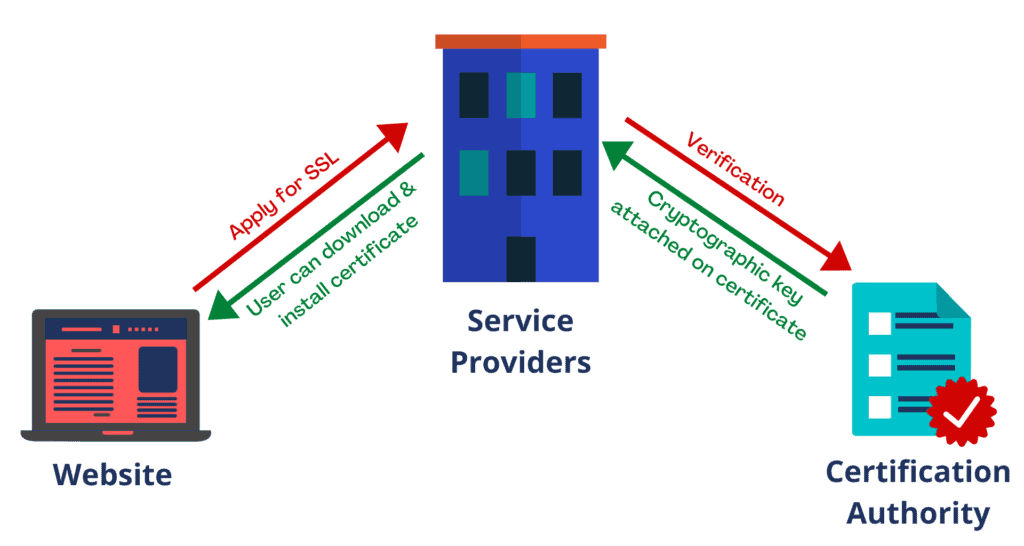
- When you apply for an SSL Certificate, the authority verifies your identity and website/organization/business according to your chosen type.
- After validating your identity, it attaches a cryptographic key to the certificate. You can easily download and install it on your website.
- Now, all your visitors can securely communicate with your site using the HTTPS encryption mechanism.
I personally prefer Namecheap for getting SSL Certificates. You can find every type of SSL Certificate here.
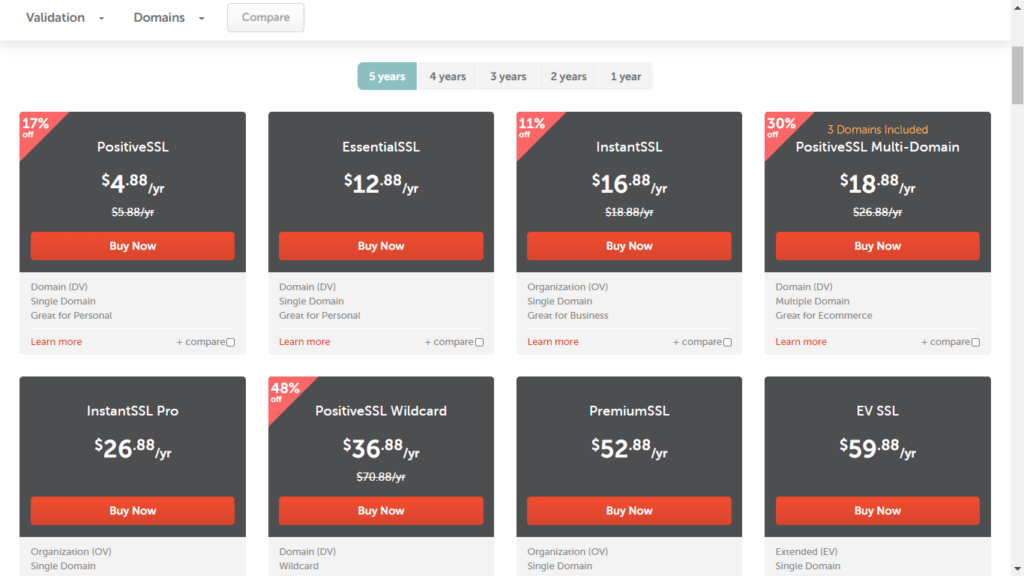
If you are a Blogger, then you can easily get a free SSL from Cloudflare or Let’s Encrypt. (Let’s Encrypt frequently requires renewal though.)
Factors to Consider While Buying an SSL Certificate
When buying an SSL Certificate, check out the following points:
- Reputation: Always get your certificate issued from a reputed Certification Authority.
For example, Comodo is the best certificate issuers, protecting a hundred million websites till date!
So, always check if the certificate authority is legal, and the number of websites secured by it.
- Warranty: Always check if your CA offer to replace the certificate if something goes wrong during a limited time interval like 3-6 months.
- Support: Always ensure that your CA provides you 24-hours chat/call support.
- Browser and Mobile Support: Check which browsers your CA supports and if it is compatible on mobile devices.
- Extra Features: Some authorities also provide additional security tools to protect your website. Do check if your CA provides them.
- Trial Period: Some certificate authorities provide a trial period of around 30-90 days to their users for free.
This is helpful if your CA is not an established brand. You can try out their service for a while and decide if it’s working for you.
- Issuing Time: It depends on the Certificate you want issued. Always ensure the time interval is relevant to the certificate you want.
- Validity: Make sure your CA provides a validity of minimum 2 years.
- No. of Domains: Finally, also check the number of domains secured with the certificate you are purchasing for your website.
Conclusion
So, I hope that you now understand what an SSL certificate is, and how important it is to get one for your website right now!
Not only does it ensure more security, but it also helps you gain your customers’ trust and rank better on Google’s Search page.
I also hope that this article helped you figure out which type of SSL Certificate would best suit your website’s needs and what factors to consider when choosing your certificate authority.
If you found this article useful, then subscribe to this blog to receive more informative content.
What other topics do you want me to cover? Let me know your suggestions in the comments section below.
This is Kripesh signing off! Take care and keep learning, guys! I’ll be back with another article soon. Cheers! 🙂


I want to start my prperty portal where people subscribe paid membership for listing which SSL suited for that & which CA is best for me .
should i use cloudways or any other managed cloud hosting for my property portal wordpress website .
Thank you Kripesh for giving most valuable content for beginers.
I follow you & will support you always.
For now you can start with the free ssl provided by your hosting provider.
Glad you liked my content.
Hi Kripesh,
just wanted to know, are you teaching/mentoring for SSL/TLS certification ?
No, I don’t teach that.